SUMMARY
This is AI generated summarization, which may have errors. For context, always refer to the full article.
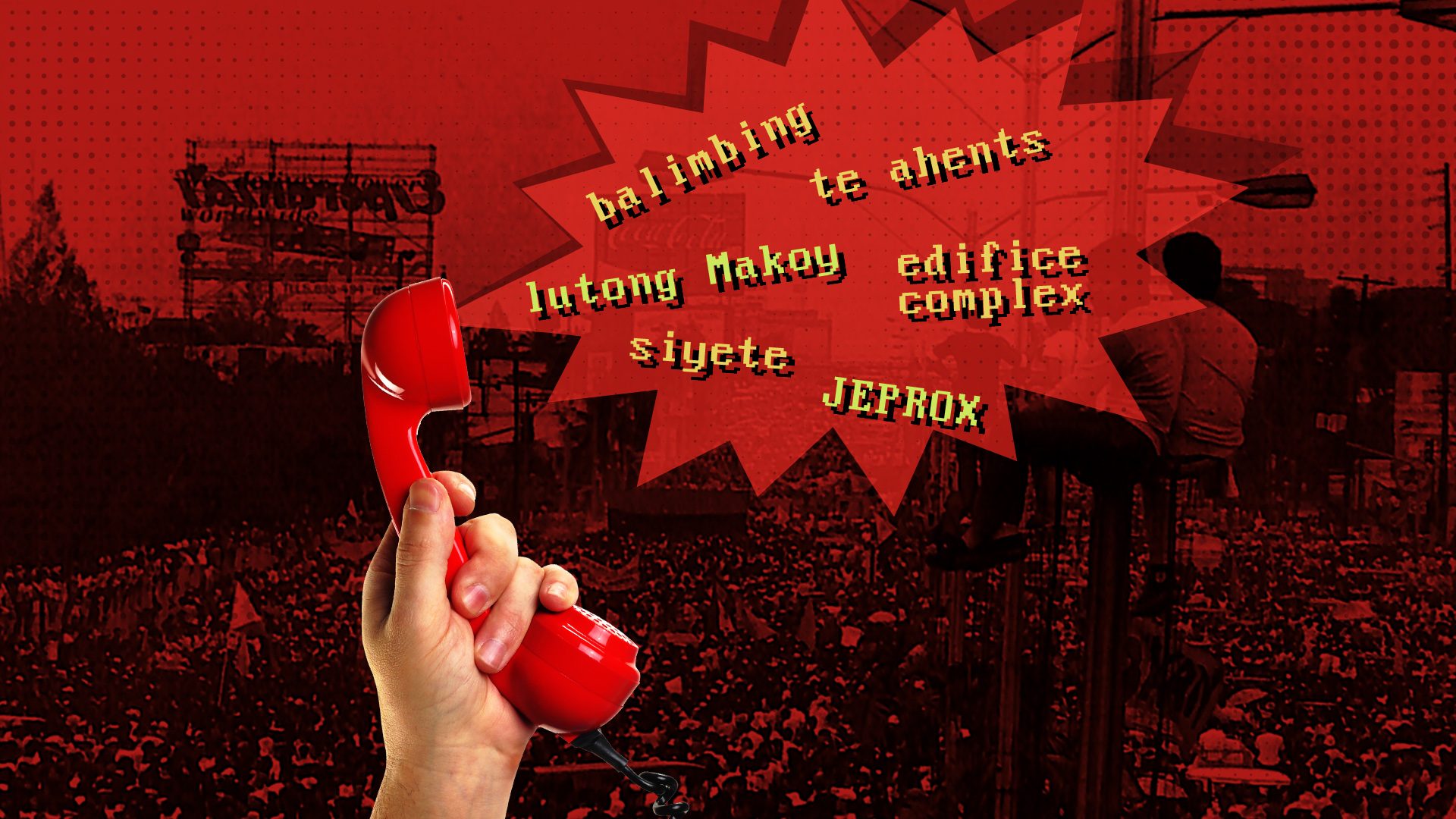
MANILA, Philippines – Slang words and turns of phrase are part of our everyday language, and as with everything, they disappear, evolve, or multiply over time. In 2021, for instance, Filipinos took up terms such as “marites,” “naurrr,” and “dasurv,” and chances are, 30 years from now, they’ll serve as a glimpse into a bygone era when memes and Tiktok-speak were on the tips of our tongues.
Similarly, slang from over 30 years ago, during the Martial Law and EDSA Revolution era of the ‘70s and ‘80s, speaks volumes of the kind of life Filipinos lived then. To help us reminisce, we asked Rappler readers who had lived through this period to share the popular terms they used back then.
Given that this was such a transitional, consequential time in our nation’s history, it’s no surprise that so much of these terms are politically charged – and some, in fact, continue to be used today, for better or worse.
Here are our top picks:
Balimbing
Let’s start with one of those terms we still, unfortunately, know and use today. “Balimbing” is a term that means “turncoat” or “party switcher,” and is based on the many-faced fruit of the same name. A lot of politicians during this heated period switched alliances not out of principle, but of self-preservation.
Dictator Ferdinand Marcos himself was a classic balimbing – jumping ship from the Liberal Party to the Nacionalista Party in ’65 prior to the presidential elections. Fast-forward to today, and his son Bongbong follows in his footsteps, dumping his place in the Nacionalista Party to go with the pro-Duterte Partido Federal ng Pilipinas prior to the 2022 polls.
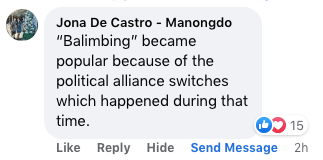
Salvage
Normally, words that have evolved into ironic usage, such as “literally” for something that isn’t really literal, is annoying at best. This isn’t the case for the word “salvage,” which, from its original meaning of saving or rescuing (think: salbabida for those inflatable life preservers), has chillingly become code for having someone tortured and extrajudicially executed.
Back then, if someone you knew was missing, you hoped against hope that they hadn’t been “salvaged.”


Lutong Makoy
What’s cooking, good lookin’? Hopefully, not the 2022 polls.
“Lutong Makoy,” a play on “lutong Macau” or Macau cuisine, sprung up in the wake of the 1986 snap presidential elections, which greatly appeared to be rigged in Marcos’ favor. (“Makoy” was a nickname for Marcos.) The botched elections wound up as a turning point in Filipino history, opening the path towards the People Power Revolution.
Given that actual lutong Macau consists of luscious egg tarts, rich stir-fried curry crab, and, of course, the famed lechon macau, we hope we never have to use the slang term that came from it ever again.

Edifice complex
A twist to the term “Oedipus complex,” the “edifice complex” is every bit the Greek tragedy, too. Then First Lady Imelda Marcos was obsessed with putting up one grandiose building after another, in a clear bid to impress foreign peers and gain clout, but in a criminally short amount of time.
The most notorious example of this was the ultra-rushed construction of the Manila Film Center. The building had collapsed mid-construction, but instead of extracting the workers who had perished in the debris, legend had it that they were instead covered in cement to allow construction to continue, as Madame Marcos had insisted the center be open in time for the very first Manila International Film Festival.
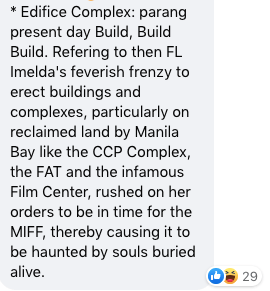
Battle cries
A revolution, of course, is not without its battle cries, and People Power had a lot of them. It also says a ton about our history that activists continue to use these chants in present-day rallies.




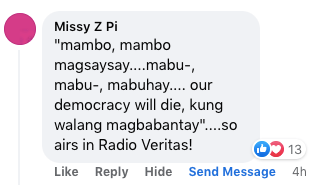

Street code
Since the Metrocom (the granddaddy of our PNP) were always on the prowl for naysayers and troublemakers – and even infiltrated civilian groups as undercover agents – it was key for Filipinos to have special code words when talking about the government and activist movements. That’s how stifled speech was in those days, and imagine that it was also far harder to organize given the lack of communication tools. You couldn’t just up and post a private FB event back then, could you?

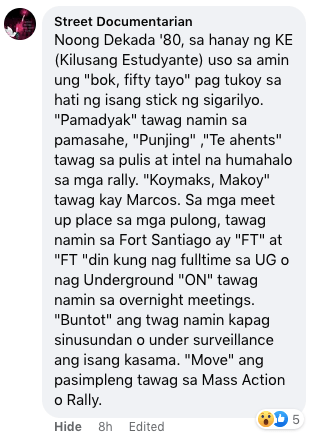

Tadbaliks
Not all slang during that period was gloom and doom, of course! Twisting and turning syllables around was the cool new trend (though Marcelo H. Del Pilar aka “Plaridel” would certainly beg to differ).
We’re sure your super astig erpats and ermats would totally agree. So c’mon, grab your tsikot at batsi na tayo! Samahan na natin ang mga tibak sa Peyups! Dehins pa ba? Olats naman o! Yosi na nga muna ako.
And yes, we still use these inside-out terms to this day, and have even added more variations over the years. What can we say? Tadbaliks lang sakalam!

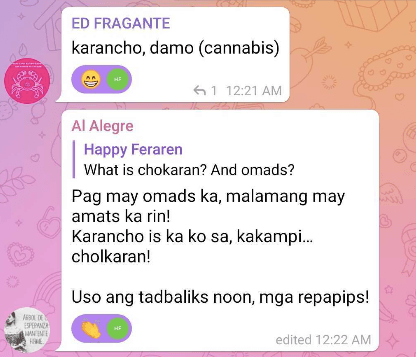

Siyete
Finally, way, way, way before Marites sashayed her way into our gossip-starved lives, people referred to tsismis as “siyete.” It was short for “siete pecados,” which was part of gay lingo then. And what did this Spanish term mean? “Seven sins,” all of which gossipers could most definitely be guilty of!

Any other slang terms and turns of phrase come to mind when you think of EDSA’s heyday? Share them in the comments section! – Rappler.com
Add a comment
How does this make you feel?

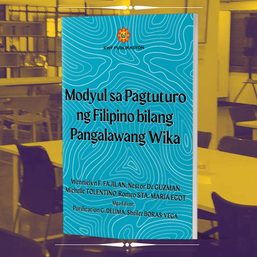



There are no comments yet. Add your comment to start the conversation.